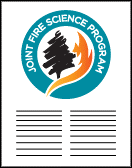United States Joint Fire Science Program

Joint Fire Science Program Research Project Reports
Document Type
Article
Date of this Version
2014
Citation
Final Report: JFSP Project Number 11‐3‐1‐33
Abstract
Climate change has resulted in rapid biophysical changes in forests of the western U.S. and has prompted the need for an increased understanding of potential impacts and adaption measures. Land managers, policy makers, and community officials lack locally relevant climate change science and are urgently calling for research to inform management decisions. Nevertheless, a substantial disconnect remains between emerging scientific information and its application in management decisions. Effective action depends on understanding regional and local implications of climate change and open, reasoned discussions about current research and potential mitigation actions among researchers, land managers, and other stakeholders. Boundary objects have been shown to be useful frameworks for facilitating the transfer of knowledge between researchers and natural resource managers. Our research aimed to convey locally relevant information on shifts in forest ecosystems and fire regimes due to changing climate, and assess how participation in deliberative workshops influenced forest managers’ opinions, intention, and use of climate change science. We focused on the development and exchange of current climate change research across scientificagency‐ policy boundaries. A goal of our research was to enhance the understanding of the cognitive processes by which boundary objects may operate. We conducted four climate change workshops in the U.S. northern Rocky Mountains and applied multiple methods of inquiry (pre‐post interviews and questionnaires) to understand whether the workshops and climate change science were perceived as useful, credible, and if they influenced behavioral intention.
Included in
Forest Biology Commons, Forest Management Commons, Natural Resources and Conservation Commons, Natural Resources Management and Policy Commons, Other Environmental Sciences Commons, Other Forestry and Forest Sciences Commons, Sustainability Commons, Wood Science and Pulp, Paper Technology Commons


Comments
US government work.